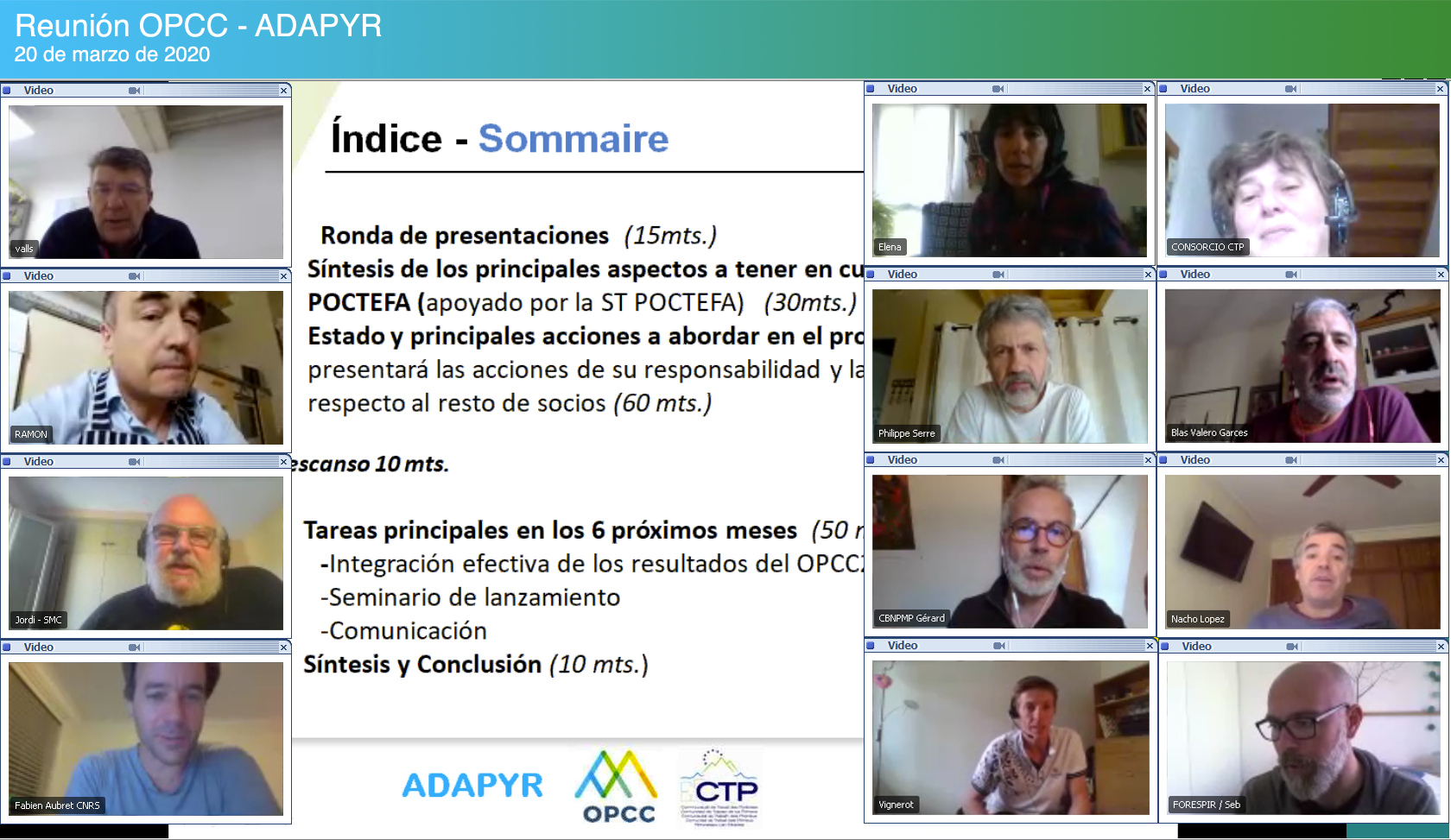Welcome to our OPCC Newsletter, the second one in 2020,
We wish all our readers good health and that little by little we will overcome this stage of confinement, which is longer than expected. We hope that we can progressively return to normality.
How can we sum up this quarter without mentioning COVID 19 and its impact on work and mobility in these last two months, and probably on the rest of the year 2020? Confinement, like many of you, has forced us to continue, from teleworking, promoting our activities, and to rethink the ways to maintain contact and cooperation; advancing in our projects by promoting online meetings.
Thus, the OPCC's ADAPYR project was officially launched through a first meeting of the Partners Coordination Committee, which was, of course, virtual. Despite the many vicissitudes inherent in the organisation of this type of meeting, 20 people were able to participate, and we were able to work on laying the solid foundations of the project. You can discover all this in more detail in the first article of this newsletter.
The reflection and the search for alternatives to overcome the effects of this health crisis that affects all of Europe has been the subject of debate in many of the meetings held in relation to other projects that the OPCC-CTP is working on such as: MONTCLIMA, MIDMACC, PHUSICOS. In this sense, it should be noted that the CTP has also created a Working Group to find solutions adapted to the specific problems of border and mountain areas. The objective of this group is to better understand the changes caused by the coronavirus and to be able, thanks to the information collected and the follow-up of the actions undertaken by the European Commission, to respond in the most appropriate way for the territories of the Pyrenees and for the benefit of their inhabitants.
It is clear that this crisis has its roots in problems that have already been detected, and that the fight against climate change must continue on the basis of all the adaptations that are required and which are now clearly urgent. This is why it is of even greater interest that this newsletter continues to collect articles of interest that report on the evolution of climate change in our territories and regions of the Pyrenees.
A new article presents the analysis of data on the evolution of temperatures in the Pyrenees from 1959 to 2019 by the CLIMPY project which confirms the increase in temperatures in the Pyrenees. In this article you will also find links to press articles pointing to the beginning of 2020 as the warmest recorded in France, Occitania as the warmest region in France and record temperatures in Andorra and Spain.
We also want to talk about some of the projects where we are involved and which are of great interest: MONTCLIMA and PIRAGUA. The first focuses on the study and prevention of natural risks in mountain areas, and the second deals with the characterization of the hydrological cycle in the Pyrenees, to improve the capacity of adaptation of the territories to the challenges of climate change. You can find more information in the attached articles and press releases as well as on the websites of each project.
You can also read a very interesting article on the impact of climate change on a species endemic to the Pyrenees, the Bonnal Lizard (Iberolacerta bonnali), which, due to the increase in temperature, is gradually being replaced by another species, the Wall Lizard (Podarcis muralis).
At the same time we echo the new draft of the National Adaptation Plan in Spain currently under public consultation (deadline 04/06/2020), which details various measures and recommendations to be adopted to achieve "a modern, competitive and climate-neutral economy by 2050". In addition, the Council of Ministers has decided to send to Congress the norm that should serve Spain to get rid of fossil fuels, and a goal of 20% less emissions in 2030.
The regions that make up the CTP also have some interesting new developments in reference to climate change:
In New Aquitaine, the association AcclimaTerra, which brings together scientists from the region and research organizations and aims to "provide local stakeholders with the knowledge necessary to adapt to climate change", is continuing its activities. Its participation is planned for the 3rd National Symposium: Adaptation and Mitigation: Climate Actions for the Territories, which will take place in Grenoble from 13 to 15 October.
Aragon, advances in the development of the law on climate change and energy transition of Aragon will soon proceed to a public consultation through the website of the Government of Aragon. On the other hand, from the web estrategiaaragonesacambioclimatico.es will be incorporated the Climate Change Observatory of Aragon, a repository of documentation on climate change in the Community of Aragon.
In Catalonia, the Department of Territory and Sustainability has granted one million euros to local authorities in Catalonia for the development of actions to mitigate and adapt to climate change. It has also recently published a tender for technical assistance to assess the vulnerability of Catalonia's transport infrastructure to the impacts of climate change.
The Basque Country presents Urban Klima 2050, an integrated European LIFE project for adaptation to climate change, led by the Basque Government's Ihobe. It has a budget of 19.8 million euros (10.2 million from the EU) and involves 20 entities which will undertake 40 projects related to coastal areas, river basins and urban areas.
From the region of Occitania, a very interesting event is being prepared: the "Carrefour Climat 2020", which will take place from 19 to 21 November 2020 in Foix, and which aims to show the inhabitants and professionals of Ariège the realities of climate change in the region.
Navarra is making progress with the LIFE NADAPTA project, in the identification of the forest masses most vulnerable to the expected effects of climate change. Effects that are seen in many species living in the Pyrenean area. This identification is essential when designing adaptive forest management strategies.
Andorra is among the first countries to approve the updated document of national contributions to combat climate change NDC 2020. The text approved by the Executive also reaffirms the increase in ambition in the Andorran Government's commitments by setting a 37% reduction in greenhouse gases by 2030.
Our web site is now available in Euskera, if you wish discover this you can click here !
We wish you a very good reading and above all health for the coming months and for our territories.
PYRENEAN CLIMATE CHANGE OBSERVATORY
Avenida Nuestra Señora de la Victoria, 8
22.700 - Jaca
Huesca - España
+34 974 36 31 00
info_opcc@ctp.org







